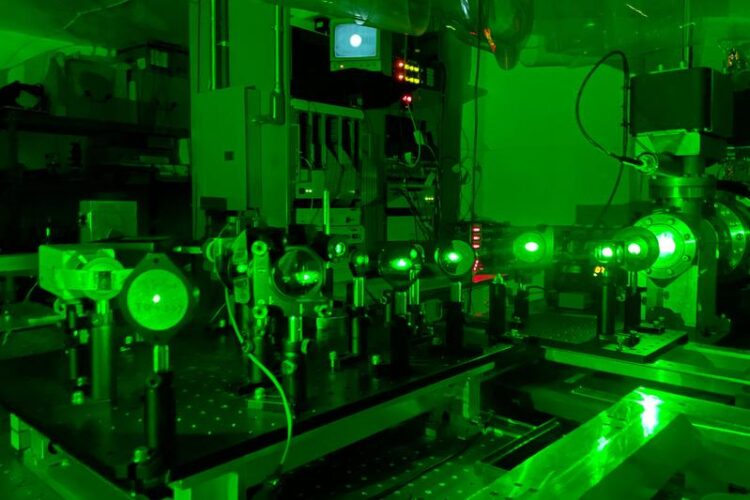Lasing below 170 nm with optics from LZH

This storage ring free-electron laser from Triangle University Nuclear Laboratory enabled sub-170 nanometer lasing with LZH optics.
Image: Triangle University Nuclear Laboratory
Up to now, oscillator free-electron lasers have only reached emission wavelengths down to 176.4 nanometers. Scientists at Laser Zentrum Hannover e.V. (LZH) have now succeeded in producing optics that allowed physicists at Duke University, USA, to generate wavelength below 170 nanometers.
The coated resonator mirrors from LZH are used in the storage ring free-electron laser (FEL) at Triangle University Nuclear Laboratory (TUNL). The highly reflective mirrors are the limiting component when it comes to achieving even shorter wavelengths with laser oscillators. Therefore, the newly developed mirrors open up new opportunities for physics research.
Fluoride-based multi-layer system
The resonator mirrors are radiation robust, and thermally and mechanically stable. The scientists at LZH optimized several thin-film techniques to produce highly dense coatings and protective capping layers. With these LaF3/MgF2-coated mirrors, a team at Duke University/TUNL demonstrated FEL lasing from 168.6 to 179.7 nm with excellent stability and reproducibility. This broad lasing range is the result of a relatively large FEL gain of more than 22%. The team at Duke University was also able to produce the first 120 MeV gamma rays at the FEL driven High Intensity Gamma-ray Source (HIGS).
The HIGS is a research facility that can generate intense, polarized, and nearly monochromatic gamma-ray beams from 1 MeV to 120 MeV. This world-class Compton gamma-ray facility is used in materials research, nuclear physics and accelerator physics research.
Laser Zentrum Hannover e.V. (LZH)
As an independent, non-profit research institute, the Laser Zentrum Hannover e.V. (LZH) stands for innovative research, development and consulting. The LZH is supported by the Niedersachsen Ministry for Economic Affairs, Employment, Transport and Digitalisation and is dedicated to the selfless promotion of applied research in the field of photonics and laser technology. Founded in 1986, almost 200 employees are now working for the LZH.
The focus of the LZH lies on the fields of optical components and systems, optical production technologies, and biomedical photonics. Interdisciplinary cooperation between natural scientists and mechanical engineers makes innovative approaches to challenges from the most different areas possible: from the development of components for specific laser systems to process developments for the most diverse laser applications, for example for medical technology or lightweight construction in the automotive sector. Eighteen successful spin off companies have emerged from the LZH up to now. Thus, the LZH has created a strong transfer between fundamental science, application oriented research, and industry.
https://www.lzh.de/en/publications/pressreleases/2021/lasing-below-170-nm-with-optics-from-lzh
Media Contact
All latest news from the category: Physics and Astronomy
This area deals with the fundamental laws and building blocks of nature and how they interact, the properties and the behavior of matter, and research into space and time and their structures.
innovations-report provides in-depth reports and articles on subjects such as astrophysics, laser technologies, nuclear, quantum, particle and solid-state physics, nanotechnologies, planetary research and findings (Mars, Venus) and developments related to the Hubble Telescope.
Newest articles

Parallel Paths: Understanding Malaria Resistance in Chimpanzees and Humans
The closest relatives of humans adapt genetically to habitats and infections Survival of the Fittest: Genetic Adaptations Uncovered in Chimpanzees Görlitz, 10.01.2025. Chimpanzees have genetic adaptations that help them survive…

You are What You Eat—Stanford Study Links Fiber to Anti-Cancer Gene Modulation
The Fiber Gap: A Growing Concern in American Diets Fiber is well known to be an important part of a healthy diet, yet less than 10% of Americans eat the minimum recommended…

Trust Your Gut—RNA-Protein Discovery for Better Immunity
HIRI researchers uncover control mechanisms of polysaccharide utilization in Bacteroides thetaiotaomicron. Researchers at the Helmholtz Institute for RNA-based Infection Research (HIRI) and the Julius-Maximilians-Universität (JMU) in Würzburg have identified a…



